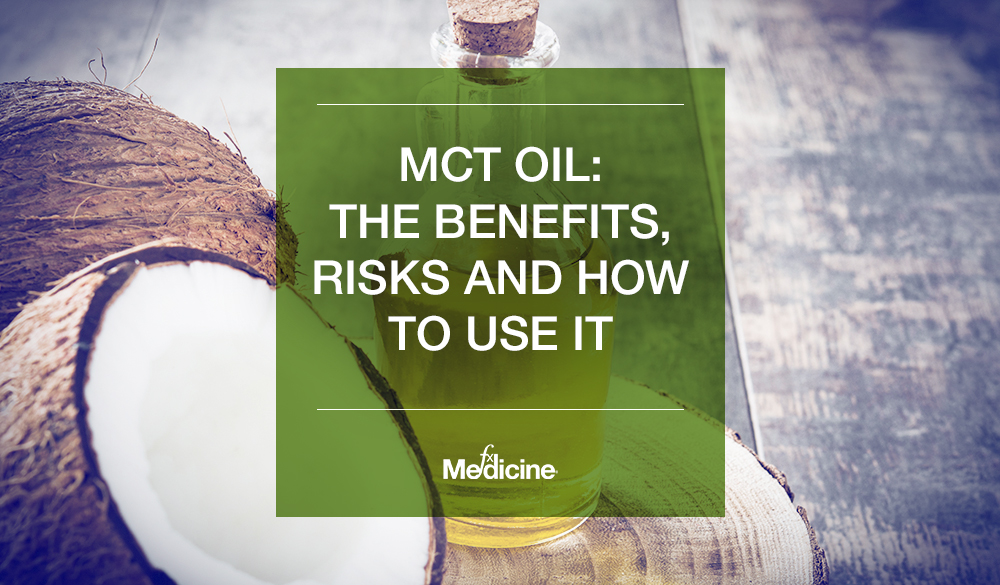Medium chain triglycerides, more commonly known as MCTs, first made their way onto the market as ‘super fats’ in the 1950s, then almost completely disappeared due to emerging health concerns with excessive saturated fat consumption. Recently, MCTs have regained popularity – especially in the form of coconut oil – due to their unique properties that have been repeatedly found to positively influence body composition, general health and athletic performance.
Ketonutrition founder and leading expert in the field of ketogenics, Dr Dominic D’Agostino, answers everything we’d like to know about MCTs.
What are MCTs?
MCTs are a compound of three medium chain fatty acid molecules linked together by a glycerol molecule. There are three main forms of MCT fatty acids; caproic (C6), caprylic (C8), capric (C10) and lauric acid (C12). Usually, MCT oils offer a mix of these forms, however, oils that are almost pure C8 have the highest conversion to ketone bodies, and therefore offer the highest potential for their unique functional and therapeutic properties.
How do they work?
MCTs are easily digestible, as they are metabolised in the liver and do not require digestive enzymes (lipases and bile salts) to be broken apart. They easily pass through the mitochondrial membrane where they enter metabolic pathways to produce acetyl-CoA, which is oxidised by way of the tricarboxylic acid cycle or further converted to ketone bodies, beta-hydroxybutyrate and acetoacetate. Alternatively, acetyl CoA can be transported into the cytoplasm of the hepatic cell and used for new synthesis of long chain fatty acids.
Within minutes of ingestion, MCTs can be converted into ketones, which are considered to be a superior fuel for the brain, muscles and other organs. This is because they provide quickly available and long-lasting energy. MCTs also enhance thermogenesis and fat oxidation, which suppresses the deposition and accumulation of body fat.
MCTs are colourless, odourless, have minimal flavour and they stays liquid at room temperature, making them the perfect fat to add to food, coffee and smoothies in order to enjoy the vast array of benefits they have to offer.
What are the benefits?
MCTs have a wide range of health and performance benefits, especially those associated with nutritional ketosis, but without having to follow strict dietary restrictions.
Gut and immune health
First of all, because of the above-mentioned mechanisms, MCT oil is often more easily digested by those struggling to digest other types of fat, such as those with malabsorption, leaky gut, Crohn’s disease or in persons who have had their gallbladder removed. MCTs also appear to lower markers of systemic inflammation, such as IL-6, which may further improve these conditions.
Other benefits include antimicrobial and antibacterial properties from C12 that help to combat various bacteria (for example the bacteria that causes ulcers), yeast and protozoa.[1] MCTs also help balance gut bacteria by offering the digestive system a break while C12 further supports the growth of normal gut flora.
The same antiviral and antibacterial properties previously mentioned also make MCTs beneficial for the immune system. Healthy fats are important for proper immune function, and since MCTs can be more easily used by the body, this may be especially beneficial for those who have trouble absorbing fats and who struggle with impaired immune function.
Nutrient absorption
MCTs appear to enhance absorption of other substances such as calcium, magnesium and amino acids,[2-4] potentially providing a nutritional advantage for those who have impaired fat metabolism and malabsorption syndromes.[5-7]
Cardiovascular health
Previous studies have shown that MCTs help lower total lipid levels and improve cardiovascular health. Those people who regularly consume coconut oil (which naturally contains MCTs) have a lower incidence of heart attack compared to those who do not consume it at all.
Increased energy
Since MCTs are processed in the liver, they are absorbed quickly and provide fast and sustained energy. MCTs move passively via the hepatic portal system to the liver without the need for a longer digestive process. Unlike almost all other foods, MCTs do not require energy to be absorbed, stored or used in the body, making them an almost perfect source of natural energy. MCTs also have been shown to increase physical endurance[8,9] and coupled with the increased immediate energy availability, would be useful to those who desire to enhance their athletic performance, as well as the elderly or frail who wish to have more energy.
Diabetes and glucose metabolism
A unique property of MCTs is enhanced glucose utilisation mediated by insulin[8,10,11] both in diabetics and non-diabetics, thereby potentially providing improved glucose control in the diabetics and in people with insulin resistance. In addition, MCT oil has been shown to protect cognition in type 1 insulin-dependent diabetics during severe hypoglycemic episodes.[12]
Neurological disorders
In several studies ketones have been shown to be neuroprotective. Ketones appear to be the preferred source of energy for the brain in people affected by Alzheimer’s disease, Parkinson’s disease and maybe even amyotrophic lateral sclerosis (ALS), because in these diseases, certain neurons have become insulin resistant or have lost the ability to efficiently utilise glucose.[13-15] As a result, neurons slowly die if no other form of energy is available.
The dietary ketosis induced by the consumption of MCTs may effectively bypass the problem of insulin resistance and restore metabolic function in cells that are glucose-starved. Small-scale studies observing patients with Alzheimer’s disease and mild cognitive impairment taking MCT oil have shown improved memory and cognitive performance in nearly 50% of participants. Studies with greater populations using MCT oil or a coconut and MCT oil combination are currently underway to further verify these results.[16]
What are the doses typically used?
Depending on the goal to be achieved, the doses could vary. For an average healthy person, the daily dose of MCTs could be in the range of 30-90mL per day. This amount, if we consume it throughout the day, will induce dietary ketosis without restricting carbohydrate.[17] For those with neurological diseases – such as Alzheimer’s disease – using MCTs to supplement their diet was found to be beneficial when using a daily dose of 20g (4 tablespoons).
It is important to note that MCT should start low (e.g. 1 teaspoon) and gradually increase over a couple weeks to avoid gastrointestinal distress or upset. Too much MCT will not harm you, however, it may cause temporary gastrointestinal discomfort.
What are the concerns of using MCT oil?
Many people don’t know that concentrated MCT oils are often derived from the mix of coconut oil and palm oil. In recent years the palm oil industry caused intense deforestation for large parts of the rainforest to make room for palm production. Unfortunately, this affected many inhabitants of these forests and has also driven many animals out of their natural habitats, such as the orangutan or the Sumatran tiger, which are both in danger of extinction. If that was not enough, many native people who rely on the rainforest for their livelihoods find their homes and their sources of income destroyed by the large-scale production of palm crops.
When buying MCT oil, make sure to look for MCT oils that are sourced only from coconut oil or sustainable and rainforest friendly palm oil.
References
- Kristmundsdóttir T, Arnadóttir S, Bergsson G, et al. Development and evaluation of microbicidal hydrogels containing monoglyceride as the active ingredient. J Pharm Sci 1999;88:1011–1015. [Abstract]
- Agnew J, Holdsworth C. The effect of fat on calcium absorption from a mixed meal in normal subjects, patients with malabsorptive disease, and patients with a partial gastrectomy. Gut 1971;12:973-977.[Abstract]
- Tantibhedhyangkul P, Hashim S. Medium-chain triglyceride feeding in premature infants: effects on calcium and magnesium absorption. Pediatrics 1978;61:537-545.[Abstract]
- Tantibhedhyangkul P, Hashim S. Medium-chain triglyceride feeding in premature infants: effects on fat and nitrogen absorption. Pediatrics 1975;55: 359-370.[Abstract]
- Roy C, Ste-Marie M, Chartrand L, et al. Correction of the malabsorption of the preterm infant with a medium-chain triglyceride formula. J Pediatr 1975;86:446-450.[Abstract]
- Hofmann A, Poley J. Role of bile acid malabsorption in pathogenesis of diarrhea and steatorrhea in patients with ileal resection. I. Response to cholestyramine or replacement of dietary long chain triglyceride by medium chain triglyceride. Gastroenterology 1972;62:918-934.[Abstract]
- Tandon, R., Rodgers, J. & Balint, J. The effects of medium-chain triglycerides in the short bowel syndrome. Increased glucose and water transport. Am J Digest Dis 1972;17;233–238.[Abstract]
- Dulloo A, Fathi M, Mensi N, et al. Twenty-four-hour energy expenditure and urinary catecholamines of humans consuming low-to-moderate amounts of medium-chain triglycerides: a dose-response study in a human respiratory chamber. Euro J Clin Nutr 1996;50:152-158.[Abstract]
- Fushiki, T, Matsumoto K, Inoue K, et al. Swimming endurance capacity of mice is increased by chronic consumption of medium-chain triglycerides. J Nutr 1995;125(3):531-539.[Abstract]
- Kaunitz H, Slanetz CA, Johnson RE, et al. Relation of saturated, medium- and long-chain triglycerides to growth, appetite, thirst and weight maintenance requirements. J Nutr 1958;64(5):13-24.[Abstract]
- Zurier RB, Campbell RG, Hashim SA, et al. Enrichment of depot fat with odd and even numbered medium chain fatty acids. Am J Physiol 1967;212(2):291-294.[Abstract]
- Galvin, J. Optimizing diagnosis and manangement in mild-to-moderate Alzheimer’s disease. Neurodegener Dis Manag 2012;2(3):291-304.[Abstract]
- Stubbs R, Harbron C. Covert manipulation of the ratio of medium- to long-chain triglycerides in isoenergetically dense diets: effect on food intake in ad libitum feeding men. Int J Obes Relat Metab Disord 1996;20(5):435-444.[Abstract]
- Tantibhedhyangkul P, Hashim S, Van Itallie T. Effects of ingestion of long-chain triglycerides on glucose tolerance in man. Diabetes 1967;16:796-799.[Abstract]
- Eckel RH, Hanson AS, Chen Ay, et al. Dietary substitution of medium-chain triglycerides improves insulin-mediated glucose metabolism in NIDDM subjects. Diabetes 1992;41:641-647.[Abstract]
- Yost TJ, Erskine JM, Greggs TS, et al. Dietary substitution of medium chain triglycerides in subjects with non-insulin-dependent diabetes mellitus in an ambulatory setting: impact on glycemic control and insulin-mediated glucose metabolism. J Am Coll Nutr 1994;13:615-622.[Abstract]
- Zhao W, Varghese M, Vempati P, et al. Caprylic triglyceride as a novel therapeutic approach to effectively improve the performance and attenuate the symptoms due to the motor neuron loss in ALS disease. PloS one 2012;7(11):e49191.[Abstract]


